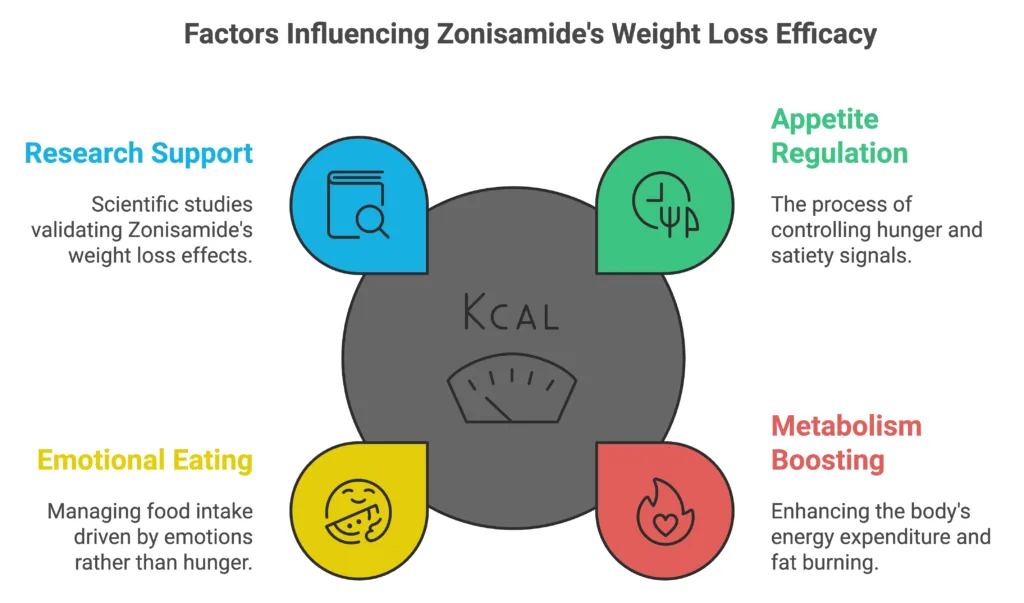Zonisamide Weight Loss: The Truth You Need to Know
Losing weight is a journey that can feel overwhelming, especially for beginners. While lifestyle changes like diet and exercise form the backbone of most weight-loss strategies, some individuals turn to medications to aid their progress. One such option gaining attention is zonisamide, a medication originally designed to treat seizures but now being explored for its potential to assist in weight management.
In this comprehensive guide, we’ll dive deep into zonisamide’s role in weight loss, including its mechanisms, benefits, risks, and how to use it safely. Whether you’re curious about its effectiveness or just starting your weight-loss journey, this article has everything you need to know.
1. What Is Zonisamide?
Zonisamide is an anticonvulsant medication primarily prescribed to manage epilepsy. Approved by the FDA in 2000, it has since been found to have off-label uses, including the potential to aid in weight loss.
The drug works by influencing the activity of certain brain chemicals, helping to stabilize nerve activity. Researchers have discovered that some of these mechanisms also affect appetite and energy regulation, leading to its use in weight management.
Key Characteristics of Zonisamide:
- Class: Sulfonamide anticonvulsant
- Primary Use: Treatment of partial seizures
- Off-Label Use: Weight loss and migraine prevention
2. How Does Zonisamide Work for Weight Loss?

Appetite Regulation
Zonisamide appears to affect neurotransmitters such as dopamine and serotonin, both of which play crucial roles in regulating hunger and satiety. By balancing these chemicals, the drug can suppress excessive appetite, reducing calorie intake naturally.
Boosting Metabolism
Some studies suggest that zonisamide may increase energy expenditure, encouraging the body to burn more calories throughout the day. This can be particularly beneficial for those with a slower metabolism, which often makes weight loss more challenging.
Emotional Eating and Mood Stabilization
Zonisamide has mood-stabilizing effects that can help individuals who struggle with emotional eating. By reducing stress and anxiety, it minimizes the urge to use food as a coping mechanism.
Research Supporting Zonisamide for Weight Loss
Several studies have explored the relationship between zonisamide and weight loss. One notable clinical trial found that participants who took zonisamide lost significantly more weight compared to those who didn’t, especially when combined with a calorie-controlled diet and exercise program.
3. Benefits of Zonisamide for Weight Loss
1. Effective Appetite Control
One of the most notable benefits of zonisamide is its ability to curb hunger, making it easier for individuals to adhere to a calorie deficit.
2. Complements Lifestyle Changes
Zonisamide works best when paired with healthy lifestyle habits. It amplifies the effects of proper diet and regular exercise, accelerating weight loss results.
3. Potential Long-Term Benefits
For individuals with obesity, losing weight with zonisamide can lead to a host of health benefits, including:
- Improved blood sugar control
- Lower blood pressure
- Reduced risk of cardiovascular diseases
4. Assistance for Resistant Weight Loss
For people who struggle to lose weight due to metabolic conditions or emotional eating, zonisamide can be a helpful tool to kickstart their journey.
4. Zonisamide Weight Loss Potential Side Effects
As with any medication, zonisamide is not without risks. It’s essential to understand the possible side effects before starting treatment.
Common Side Effects:
- Nausea
- Drowsiness
- Dizziness
- Irritability
Serious Side Effects:
- Metabolic Acidosis
Zonisamide can lower blood bicarbonate levels, leading to a condition called metabolic acidosis. Symptoms include fatigue, confusion, and rapid breathing. - Kidney Stones
There is a small risk of developing kidney stones while taking zonisamide. Staying hydrated can reduce this risk. - Allergic Reactions
Zonisamide is a sulfa-based drug, so individuals allergic to sulfa medications should avoid it.
Precautions
- Avoid alcohol, as it can amplify drowsiness.
- Discuss pre-existing conditions like liver disease, kidney issues, or depression with your doctor.
5. Dosage and Recommendations
The right dosage of zonisamide for weight loss varies depending on individual factors such as age, weight, and health conditions. It’s crucial to follow your doctor’s guidance.
Typical Dosage:
- Starting Dose: 25-50 mg per day
- Maintenance Dose: Up to 100-400 mg per day, adjusted gradually
Tips for Safe Usage:
- Start Slowly: Begin with a low dose to allow your body to adapt.
- Stay Hydrated: Drink plenty of water to prevent kidney stones.
- Monitor Side Effects: Report any adverse reactions to your healthcare provider immediately.
6. Is Zonisamide Right for You?
While zonisamide shows promise for weight loss, it’s not a one-size-fits-all solution. It may be suitable if:
- You have obesity with a BMI over 30.
- You’ve tried diet and exercise without significant results.
- You’re under medical supervision.
When to Avoid Zonisamide:
- Pregnancy or breastfeeding
- Allergies to sulfa drugs
- Pre-existing kidney or liver conditions
7. Expert Opinions on Zonisamide and Weight Loss
Healthcare professionals generally view zonisamide as a helpful adjunct to traditional weight-loss methods. However, experts caution against relying solely on medication, emphasizing the importance of lifestyle changes.
According to Dr. Jane Roberts, a weight-loss specialist:
“Zonisamide can be a valuable tool for individuals struggling to lose weight. However, it should always be used in conjunction with a well-balanced diet, regular exercise, and behavioral changes.”
8. Frequently Asked Questions (FAQ)
Q1: Can zonisamide be used as a standalone weight-loss solution?
A: No. While effective, zonisamide works best when paired with diet and exercise. It’s not a replacement for healthy habits.
Q2: How quickly can I expect results?
A: Results vary by individual. Most users notice weight loss within a few months when taking the medication alongside lifestyle changes.
Q3: Are there alternatives to zonisamide?
A: Yes, medications like phentermine, orlistat, and topiramate are also prescribed for weight loss. Natural options include dietary supplements like glucomannan.
Q4: Will I regain weight after stopping zonisamide?
A: Weight regain is possible if healthy habits aren’t maintained. Focus on sustainable changes to prevent rebound weight gain.
Q5: Does insurance cover zonisamide for weight loss?
A: Zonisamide is not FDA-approved for weight loss, so insurance coverage depends on your policy and its primary prescribed use.
9. Conclusion
Zonisamide offers a promising option for individuals struggling with weight loss, particularly when paired with a balanced diet and regular exercise. While its appetite-suppressing and metabolism-boosting properties are appealing, it’s not without risks. Always consult a healthcare provider before starting zonisamide to ensure it aligns with your goals and overall health.
Weight loss is a marathon, not a sprint. Medications like zonisamide can help, but they work best when combined with sustainable lifestyle changes.


